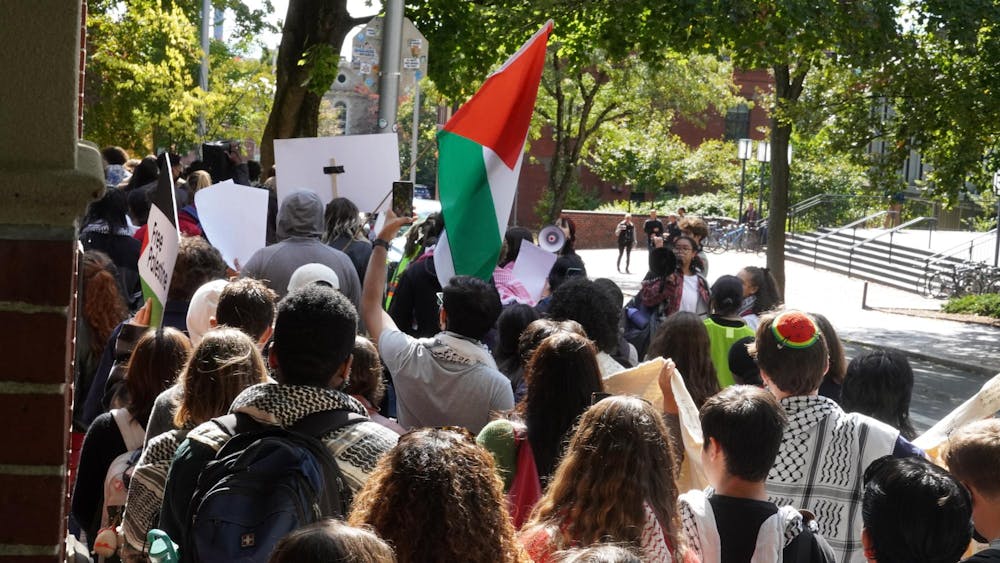On Wednesday, the University announced that the Corporation will not divest from 10 companies with ties to Israel after an advisory body recommended against a divestment proposal.
Students both in support and opposition to divestment were shocked by the vote, which occurred at a special meeting prior to the Corporation’s October meeting. The meeting itself wasn’t announced until a campus-wide email announced Brown’s decision on divestment.
Garrett Brand ’26, a pro-divestment student activist, heard of the Corporation’s decision when preparing to chalk walkway on the Main Green about Hurricane Helene and Milton, which made landfall in Florida on Wednesday.
“We're not going to go chalking today,” Brand recalled saying after getting a group chat notification about the decision.
Brand was in a state of shock, he told The Herald. “This was just so out of left field for everybody,” he said. “There was no indication that the vote had already taken place.”
Victoria Zang ’26, president of Chabad at Brown, was also surprised by the announcement.
“I was sitting at the Ratty with a couple of my friends, and we weren't expecting the decision to come out yesterday,” she said.
On the decision, “I'm very happy,” she said.
“It's important to note that the vote was no more or less transparent than had it been conducted during a regularly scheduled meeting,” University Spokesperson Brian Clark wrote in an email to The Herald.
In the weeks leading up to the Corporation vote, students presented pro- and anti-divestment arguments to the Advisory Committee on University Resources Management, or ACURM, which was charged with evaluating the social harm of 10 companies with ties to Israel. In their deliberations, ACURM also held two listening sessions for community members.
ACURM — a body made up of faculty, staff and students — recommended against the student-led divestment proposal with a vote of 8-2, with one abstention.
Aboud Ashhab ’25, one of the pro-divestment students who presented to ACURM, criticized the committee's decision, believing its charge makes it “impossible” for the University to divest.
In ACURM’s recommendation to President Christina Paxson P’19 P’MD’20, the advisory body wrote that under the charge “there must be harm and that harm must be caused by investment or expenditure of University financial resources.”
“Through that scope, nothing constitutes social harm, because it's not a direct cause,” Ashhab said.
In their letter to the Brown community announcing the divestment vote, Paxson and Chancellor Brian Moynihan ’81 P’14 P’19 wrote that ACURM’s charge raises significant questions when it comes to divestment decisions.
“Given the standards set forth in the ACURM charge and today’s realities in which Brown has minimal exposure to direct investments, when, if ever, would there be a decision to divest?,” they wrote.
They added that this will be a topic of discussion at the next Corporation meeting, which traditionally occurs on the third weekend of October.
Ashhab and Brand expressed frustration with ACURM’s discussion of University finances. In its report, ACURM called the University’s investment in the 10 companies listed in the divestment proposal too small and “too distantly removed from ‘social harm’ to thus justify divestment action.”
ACURM estimated that the endowment includes 0.009% of the aggregate market value of the ten companies in the proposal and they make up less than 1% of Brown’s endowment, or around $66 million.
“The scope of ACURM as a committee was not about materiality,” Ashhab said. “It was about social harm.”
Brooke Verschleiser ’25, president of Brown Students for Israel, said that she was “not surprised the Corporation voted against divestment” but added she was not expecting ACURM’s decision.
“I think they made the right decision,” she added. “I think it shows that they really listened to the input they got, rather than relying on a popularity contest on campus.”
A recent Herald poll found that 60% of undergraduates supported the divestment proposal, with 15% opposing it. 58% of Jewish respondents opposed the proposal, The Herald previously reported.
“My personal opinion is that an issue such as this … should never have been voted on in the first place,” Zang said.
Verschleiser said that a “weight is kind of lifted.” Verschleiser was one of the students who gave an anti-divestment presentation to ACURM last month.
In regards to the divestment vote, “there’s nothing more to do on our end,” she said.
“In terms of the divestment topic, I think it's now a non issue,” Verschleiser said. “The Corporation voted. The Corporation made their decision.”
Zang expressed disappointment at the reaction of some pro-divestment students, some of whom have since protested the Corporation’s decision and strongly criticized Paxson for the vote.
“It's just disrespectful and goes against the values of Brown,” she said.
Zang hopes “the decision will open the doors for conversations” on campus. She previously believed that the vote would help bring closure, but now she’s not sure: “There's so much hate right now.”
The Corporation’s decision followed months of student organizing.
Pro-divestment students held two sit-ins that resulted in the arrests of 61 students, an eight-day hunger strike and an encampment on the Main Green. The encampment was voluntarily disbanded in exchange for a Corporation vote on divestment, following an agreement was reached between protestors and administrators.
But pro-divestment students indicated that their push is not over.
“It’s about more than divestment,” Ashhab said. “I'm fighting for my family. I'm fighting for my friends back home, for their right to life and for their right to dignity.”
“This is not the end all be all to fighting for Palestine,” he said.

Ryan Doherty is the managing editor of digital content and vice president of The Herald's 135th editorial board. He is a junior from Carmel, NY who is concentrating in chemistry and economics. He previously served as a university news and science & research editor, covering faculty and higher education.





